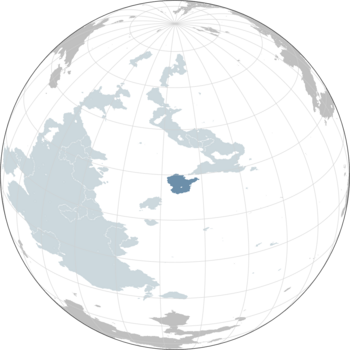Salmuria: Difference between revisions
No edit summary |
|||
| Line 182: | Line 182: | ||
===Naval forces=== | ===Naval forces=== | ||
TBD | TBD | ||
==Special Forces== | ===Special Forces=== | ||
TBD | TBD | ||
==Infrastructure== | ==Infrastructure== | ||
===Transportation=== | ===Transportation=== | ||
Revision as of 18:47, 24 November 2023
Great Nation of Salmuria, Abode of the Heavenly Peace 𐤮𐤠𐤭𐤩𐤣𐤶𐤯𐤦𐤳 ""Sarlθẽtiš"" | |
|---|---|
 | |
| Status | Theocratic temple state |
| Capital | Idulula, Enkoth, and Salmus |
| Largest | Idulula |
| Official languages | Salmurian language, High Salmurian |
| Recognised regional languages | Salmurian Malay, Salmurian Ainu |
| Ethnic groups (2020) | Salmurian, Demographics of Salmuria |
| Religion | Qibirad |
| Demonym(s) | Salmurian |
| Government | Theocracy governed by 3 selected god incarnates |
• Ciwš | Idulula (taken name) (𐤦𐤣𐤰𐤩𐤰𐤩𐤠) |
• Ciwš | Enkoth (taken name) (𐤤𐤫𐤨𐤬𐤣) |
• Ciwš | Salmus (taken name) (𐤮𐤠𐤩𐤪𐤰𐤮) |
| Legislature | Gujan Council, Laleaara, and Vidqelara |
| Population | |
• 2023 estimate | 54,043,342 |
| Currency | Obol (SOB) |
| Time zone | SST |
Salmuria (Salmurian: Sarldẽtiš 𐤮𐤠𐤭𐤩𐤣𐤶𐤯𐤦𐤳), officially the Great Nation of Salmuria, Abode of Heavenly Peace (Salmurian: TBA) is an independent island country in Atusia in the Sea of Kasai it is officially a temple state governed by the 3 avatar gods of the Qibirad. It has roughly 54 million inhabitants. Salmuria also has 3 official capital cities being Enkoth, Salmus, and Idulula each named for their Qibirad incarnate god with Idulula housing the Grand Gujan Council and is the largest of the 3.
While a theocracy Salmuria does have its own parliamentary system which functions primarily through the Guyan System where each gujan appoints its own delegates to the grand council for national legislation and functions. Salmuria has its own local democratic systems in the gujans.
TBA
Etymology
Salmuria is an anglicized version of the native name "Sarlθẽtiš", it is unknown exactly where the name Sarlθẽtiš comes from but it is most likely believed to come from either the original name of one of the 3 capital cities or from an old Naciwas kingdom in mainland Atusia.
History
Pre Naciwas History
Before the arrival of the Naciwas Anatolians the island of modern Salmuria was inhabited primarily by Ainu in the North and East, and Malays in the South who have established multiple small trading clans and kingdoms which would be the predecessor of the modern Sriviš Gujan.
Arrival of the Naciwas
Establishment of the Qibirad
Demographics
Religion
Qibirad is the official state religion of Salmuria with the vast majority of Salmuria expected to follow some form of it. Other religions primarily exist only really in coastal settlements as non Qibriad places of worship are only permitted on manmade islands by Salmuria's trading ports for the use of foreigners.
Language
The official language of Salmuria which all Salmurians are expected to be able to speak is Salmurian. The modern Salmurian language is one of the only surviving Anatolian languages and its modern form has taken much from the influence of the local Ainu and Malayo-Polynesian languages. There is also another rarer form of Salmurian called High Salmurian which retained much more old Anatolian features than modern Salmurian but it is used primarily in law and among the elite but with the modernization of Salmuria, High Salmurian is considered an endangered language.
Salmuria has always been an important stopping point for trade going between mainland Atusia and the Savang sub-continent and for this reason it is common for many young Salmurians and those living in coastal towns and cities like Salmus to be bi or tri-lingual with foreign languages.
Geography
TBD
Climate
TBD
Government and Politics
Legislature
Gujan Councils , Laleaara, and Vidqelara TBD
Government
TBD
Military
Salmuria's armed forces are both a model of a professional modern force and at the same time a relic of Salmuria's ancient and traditional form of governance. Salmuria's Armed Forces consist of the Green Standard Army, the The Four Banners, the Qibirad Millitant Orders, and the Salmurian Navy. There is no separate air force branch as the four banners and the green standard army each maintain their own planes as does the Salmurian navy.
Land Forces
TBD
Aerial Forces
TBD
TBD
Special Forces
TBD
Infrastructure
Transportation
TBD
Energy
TBD
Culture
TBA
Food
TBA
Economy
TBA


